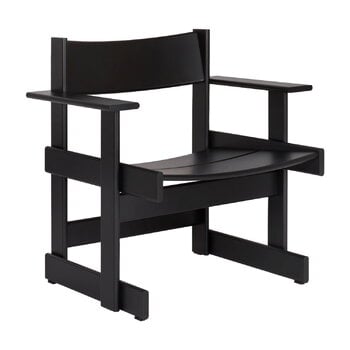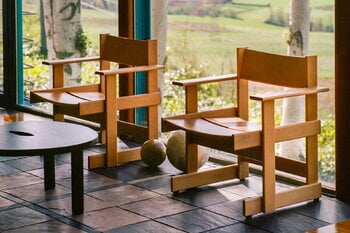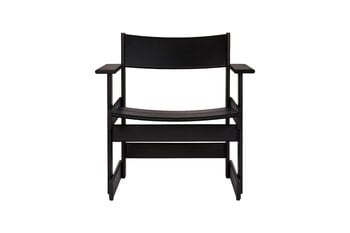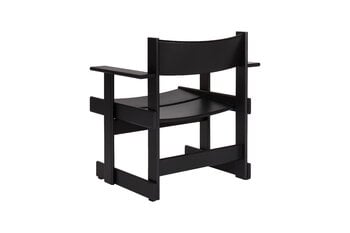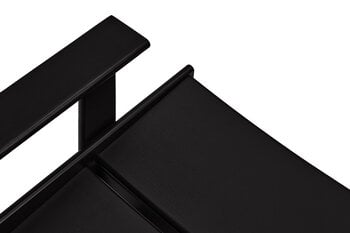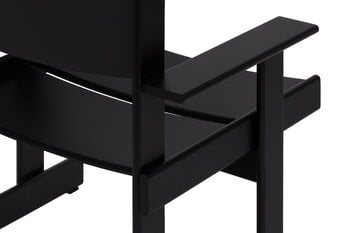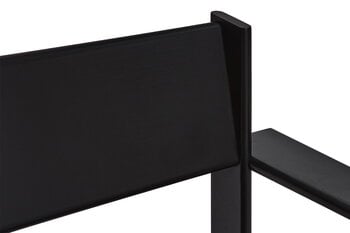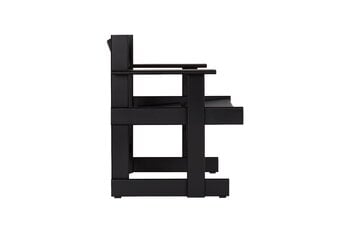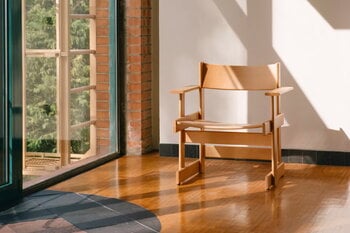Hem's Bullnose lounge chair has a robust and distinctive character that will delight in the living room as well as in public spaces. Designed by Marco Campardo, the beech chair's sturdy form is softened by rounded corners, a feature more typically found on shelves and tables rather than chairs. The skilfully joined wooden parts make the Bullnose lounge chair not only stylish but also extremely comfortable to sit on.
Bullnose lounge chair, black
Hem
Description
Hem's Bullnose lounge chair has a robust and distinctive character that will delight in the living room as well as in public spaces. Designed by Marco Campardo, the beech chair's sturdy form is softened by rounded corners, a feature more typically found on shelves and tables rather than chairs. The skilfully joined wooden parts make the Bullnose lounge chair not only stylish but also extremely comfortable to sit on.
Product details (13)
- Colour
- Black
- Width
- 71 cm
- Depth
- 63 cm
- Height
- 74 cm
- Seat width
- 54 cm
- Seat depth
- 49 cm
- Seat height
- 40 cm
- Armrest height
- 58 cm
- Measurement details
- Backrest width 50 cm, legs width 61 cm
- Material
- Black stained beech
- Weight
- 11 kg
- Stackable
- No
- Care instructions
-
Clean the surface with a soft, damp cloth. Always dry the
surface after cleaning using a dry cloth.
- Product ID
Designer
Marco Campardo is a London-based designer known for his focus on production, research, and teaching. His work emphasizes hands-on experimentation with materials, exploring themes of culture, identity and authenticity through innovative design practices. By adapting industrial processes, Campardo creates aesthetically refined objects that challenge conventional mass production and value traditional crafts. He has designed for Hem, for example, and won prestigious awards such as the Ralph Saltzman Prize in 2023 and the Wallpaper Design Awards in 2020.
View all productsReviews (0)
Sustainability
The Product Sustainability Framework, our criteria of sustainable design, helps you find the most sustainable products in our selection. Read below which sustainability criteria this product has met.
Working conditions & labour 8/9
-
Equal opportunities for all employees
-
Commitment to UN Global Compact, fair compensation for all employees
-
Corporate responsibility requirements defined and communicated for suppliers
-
Systematic work for improved inclusion and well-being in the workplace
-
Transparent supply chain
-
Suppliers' compliance to a code of conduct ensured
-
Compliance to the UN Guiding Principles on Business and Human Rights ensured in the supply chain
-
Support for community involvement in the supply chain
-
Direct suppliers audited and certified
Eco-friendly production 8/9
-
Fair and resource-wise water-use in production
-
No incineration or landfilling of returned items
-
No use of endangered species as materials
-
No direct environmental emissions or waste (excl. GHGs) from production
-
The sustainability of direct suppliers' production is addressed and monitored
-
Production and material sourcing that respect biodiversity, animal rights, and natural ecosystems
-
Material-efficient and ecological packaging
-
No potentially harmful chemicals used in own production
-
Positive impact on nature’s well-being through operations that regenerate natural ecosystems
Climate impact 4/8
-
Company's direct greenhouse gas emissions identified and commitment to reduction
-
Product's carbon impact identified and commitment to reduction
-
Guidance on energy- and eco-efficient use of the product
-
100 % renewable energy in own production and operations
-
Contribution to climate initiatives beyond the brand’s direct operations
-
Low-carbon or compensated transportation
-
Carbon footprint of the product calculated and goals set to reduce it
-
Carbon neutral or carbon negative product
Sustainable materials 6/6
-
Sustainable and long-lasting material choices
-
No harmful or hazardous substances
-
Responsible raw material sourcing and production
-
Materials suited for circularity: monomaterials, recyclable finishings, renewable or recycled contents etc.
-
Ecological materials: natural, biodegradable, recyclable or recycled contents
-
Outstanding materials in terms of innovativeness, responsibility, sustainability and circularity: local production or sourcing, 100 % recycled content, C2C-certification etc.
Circular design 4/5
-
High aesthetic quality promoting long-term use of the product
-
Technically durable product design and material choices
-
Design for enduring life-long quality
-
Design and support for product maintenance, repair and upgradability
-
Innovative circular design solutions: circular service system, resale platform, remanufacturing, collection of used products, etc.
